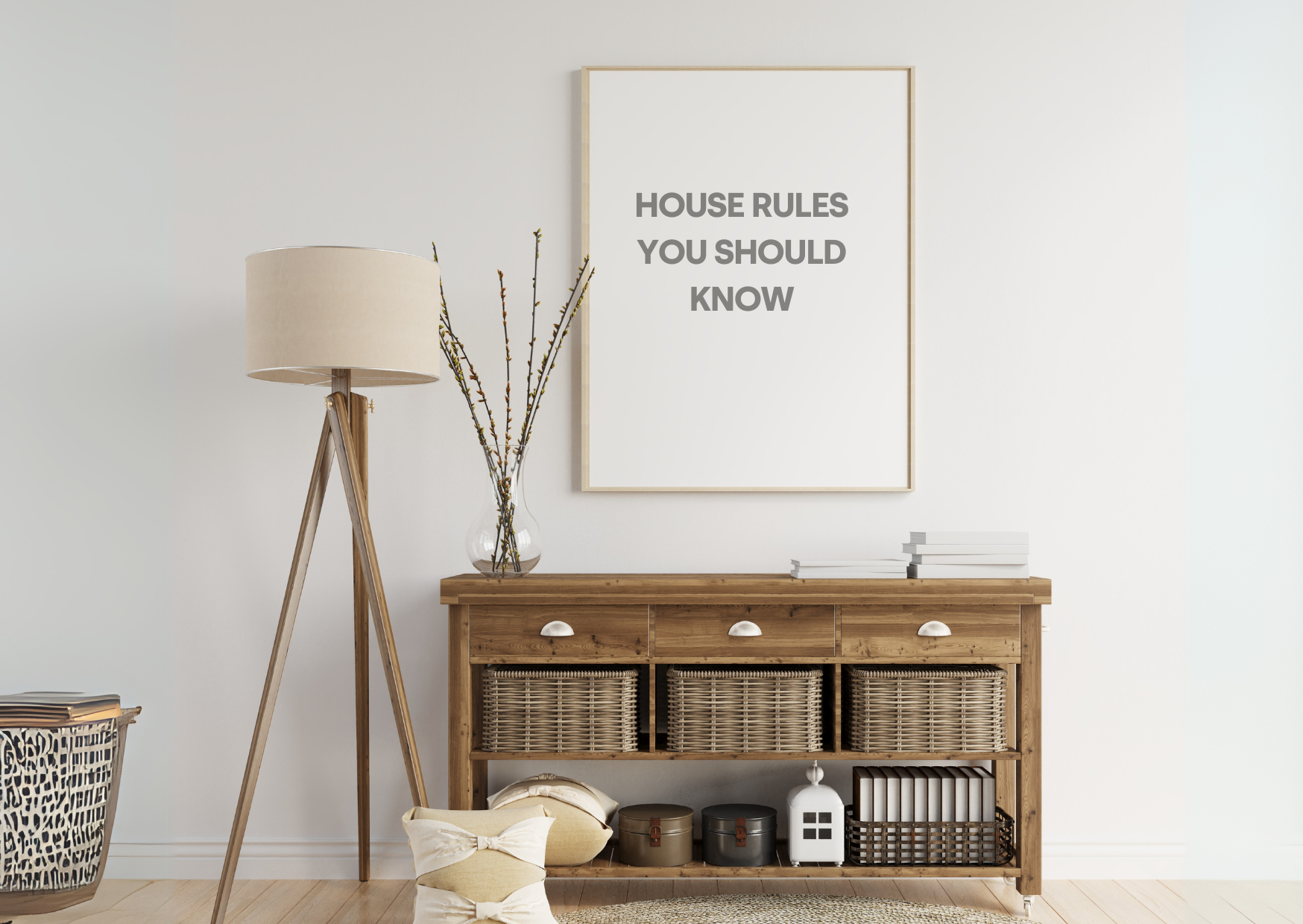Table of Contents
Updated on: September 3, 2025
Running an Airbnb isn’t just about giving someone a bed and a clean set of sheets. The real trick is setting clear expectations so guests know what’s okay and what’s not. That way, you save yourself a lot of stress, and they get a smoother stay.
House rules are your best friend here. They cut down on noise issues, random extra guests showing up, and the kind of messes nobody wants to deal with. Keep them fair, keep them simple, and make sure people actually read them.
In fact, there are a handful of rules every host should probably spell out from day one. Here are six of the big ones worth adding to your listing.
Check-In and Check-Out Times
First impressions really do matter, and check-in is the moment that sets the vibe for the whole stay. Get that part wrong and guests start off frustrated. Nail it, and they relax right away.
The basics?
- Be clear about when people can come and when they need to leave.
- Check-in time – let them know when the place is actually ready.
- Check-out time – so you’ve got enough time to clean before the next guest.
- Late fees – if you charge for overstaying, say it upfront.
If you’re doing self-check-in, don’t just say “there’s a lockbox.” Spell it out. Send the code, the location, the Wi-Fi, and any extra steps (like ID verification) before they even ask. Saves you the late-night “how do I get in?” texts.
Early check-ins and late check-outs? Decide on your policy and be upfront. Some hosts add a small fee, others just do it if the calendar’s free. Guests will appreciate a clear answer either way.
One last tip: send a friendly reminder the night before check-out. Something simple like, “Hope you enjoyed your stay! Just a reminder that check-out’s at 11, so we can get the place ready for the next guest.” Keeps things smooth without awkward confrontations.
Smoking Policies
Smoking indoors is one of those things that can wreck a place fast – the smell sticks, furniture gets damaged, and there’s always the fire risk. That’s why a no-smoking rule inside the house is pretty much non-negotiable.
Spell it out clearly:
- No smoking indoors, and that includes e-cigs and vapes.
- If there’s a spot outside for smokers, say so – and make sure guests know to clean up after themselves.
- Break the rule? Expect a cleaning fee.
If the whole property is smoke-free, repeat it a few times – in the listing, the house manual, even in pre-arrival notes. It saves awkward conversations later.
Some hosts even add air-quality sensors that can pick up smoke particles. They don’t invade privacy, but they do help enforce the rule without constant checking.
Visitor and Party Limitations
Parties are a headache waiting to happen. Noise, damage, upset neighbors – and Airbnb will crack down if it happens in your place. Best move? Make the rule crystal clear from the start.
Keep it simple:
- Overnight stays are for booked guests only.
- Visitors need approval first.
- Parties, events, big gatherings? Just don’t.
- Cap the number of people allowed – [insert number].
Want extra backup? Use smart locks so only registered guests can get in. Outdoor cameras (within Airbnb’s rules) also help keep an eye on things. Airbnb itself even flags some risky bookings, like last-minute local reservations.
And don’t wait until check-in to say it. Remind guests ahead of time that breaking this rule means extra fees or even a cancelled stay. A quick message saves a lot of drama later.
How to Prevent Unapproved Parties in Your Rental
Parties can trash a property fast and annoy the neighbors even faster. The best way to avoid them is to get ahead of it.
A few steps that help:
- Set a hard cap on how many people can stay. Make guests agree before booking.
- Watch out for risky reservations – last-minute weekend bookings from locals are often a red flag. Airbnb’s screening tools can help catch those.
- Use noise monitors like Minut or NoiseAware. They don’t invade privacy, but will ping you if the volume gets out of hand.
- Add a security deposit. Even the idea of losing money makes guests think twice.
- Be clear about what happens if rules get broken – cancellation, no refund, end of story.
None of this guarantees you’ll never have a problem, but it cuts the chances way down.
Noise Restrictions
Neighbors don’t complain about much, but noise will do it every time. Too loud and you’re looking at angry messages, maybe even fines if there are local rules.
Here’s the basic setup most property managers use:
- Quiet hours run from 10 PM to 8 AM.
- Keep TVs and music down to a normal level.
- No big parties or late-night gatherings, period.
Want a little backup? Noise sensors like Minut or NoiseAware help. They don’t record anything, just measure volume and ping you if things get out of hand.
The trick is to remind guests early. Drop it in the listing, in your house manual, maybe even a message before they arrive. A quick note is usually enough.
If someone does push it, just send a polite message through Airbnb. Most guests don’t want trouble – they’ll quiet down once they know you’re watching.
Cleaning and Trash Disposal
No one’s asking guests to scrub the place top to bottom – but a few basics keep things under control.
Think simple stuff:
- Wash the dishes you used.
- Trash goes in the right bins.
- Towels in the basket.
If you want beds stripped or the dishwasher started, don’t hint – spell it out. A quick note or checklist saves a lot of back-and-forth later.
And if someone leaves the place looking like a disaster? That’s when a cleaning fee makes sense. Just be upfront in the listing about what “too dirty” means.
A couple of small nudges help too – clear recycling labels, a note near the bin, maybe some wipes in the cupboard. Guests usually follow the path of least effort.
Pet Policies
Pets can be great guests… or a total headache if there aren’t rules in place. If you allow them, make it clear what’s expected up front.
Keep it simple:
- Pets need to be house-trained.
- No pets on the beds or furniture.
- Owners clean up after them right away.
- Add a flat pet fee (example: $50, non-refundable).
If pets aren’t allowed, don’t leave room for confusion – say it plainly in the listing: “No pets.” Just remember, Airbnb requires service animals to be accepted.
For pet-friendly places, little extras go a long way: a bowl, some waste bags, maybe even a pet bed. It shows thought and keeps things tidier.
Some hosts also add a refundable deposit for damage. Not a bad idea, and it makes inspections after check-out easier.
How to Specify Rules for Guests
House rules aren’t just about protecting the property – they set the tone for how guests treat the space. When expectations are clear, stays go smoother and problems are way less likely to pop up.
And if managing all of this feels like a lot, tools like Hostify can take the pressure off. Automated messages, guest communication, even rule reminders – it’s all handled in one place so you’re not chasing details.
Need something simple to share with guests? Grab our Airbnb House Rules checklist. It’s a quick way to keep things organized and cut down on the back-and-forth.
FAQ
 Join our referral program & earn up to $500.
Join our referral program & earn up to $500. 







